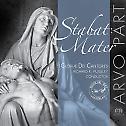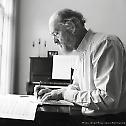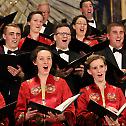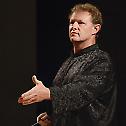Arvo Part – Stabat Mater
A new and deeply moving expression of the Truth that sustains the Universe
Stabat Mater, the new CD recording of music by the composer Arvo Pärt, performed by the Choir and orchestral ensemble of Gloriae Dei Cantores under the direction of Richard K. Pugsley, represents a new and fresh take on sacred music, and it also is a new level reached by the performing artists and the sound engineering team that recorded this disc.
Arvo Pärt has been steadily gaining prominence in the classical music world for many years. His work became known to me around 2011, when a colleague of mine, Dr Nicholas Reeves, worked with the Estonian composer on a concert series performed that year. Although I had yet to hear Pärt’s compositions, the enthusiasm Dr Reeves expressed was very strong.
The world of Orthodox Christian composers and musicians is very small in the West. Few composers have been effective at transmitting the ethos of the Eastern Orthodox Church through the lens of Western classical and choral music. Most of us (for I compose as well), find ourselves hitting a wall when trying to bring these two worlds together, with the usual result for decades being rather hit-and-miss in terms of any sort of authentic Orthodox Christian ethos in Western sacred music.
Arvo Pärt is one of the very few composers who has accomplished excellence and beauty in his approach. This CD, Stabat Mater, presents a stunning example of what happens when a deeply Orthodox worldview meets the heights of Western classical training and performance.
As a singer, composer and recording engineer that is deeply immersed in the Russian and Byzantine Orthodox Christian musical traditions, when I started to listen to the disc, I was challenged by something that was evocative of recent modern Western sacred works, but almost immediately the Orthodox ethos came through. That ethos is reflected in Pärt’s compositional form of Tintinnabuli, which reflects something far different from the sentimentality of many great Western sacred works, but does something that is present in Orthodox Christian worship: Its pushes the listener not into a memory of sacred events, but to “enter in” and be mystically present in those events, just as the Divine Liturgy and other liturgical services in the Orthodox Church also do. The form in which this happens is delightfully different from the techniques employed in the Slavic and Byzantine ethos, and while borrowing on Gregorian chant structure, Part’s Stabat Mater does not merely meditate on the passion of Mary at the foot of her Son’s Cross, we become mystically present with her.
All the selections on this disc are excellent. This is very serious music, not dark, not depressing, but possessing the serious, dead-on presentation that the Eastern Orthodox Church has always used in bringing us into the Divine reality of Christ’s life, Passion, Death and Resurrection. To move beyond sentimental meditation into being present is a great gift, and Arvo Pärt gets us there in his work.
This is more evident when taken into account that the performers of Gloriae Dei Cantores and Richard Pugsley approach this work steeped primarily in the Benedictine tradition of the Christian West. In listening to this disc, I cannot imagine a better interpretation of this music, both technically and spiritually, than what is presented here. A true meeting of East and West, neither side excluding the other, but standing united in the Truth of Christ. This is what happens on this disc.
The recording is superb. Maestro Pugsley, Paul Tingley co-produced this record, and the recording engineers Brad Michel and Dan Pfeiffer did a superlative job bringing this recording to life. The presence of the choir and orchestra is intimate and spacious at the same time, with all nuances of voice and instrument flawlessly presented to the listener.
With some Grammy Award nominations and wins on projects I have worked on as an experiential basis, I enthusiastically and gratefully congratulate this team on absolutely amazing work. I am very pleased that this recording is a part of my own collection.
More information about Stabat Mater, with a sample, can be found here.
Source: Orthochristian.com





